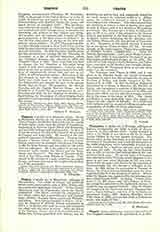

Thapsus, a titular see in Byzacene Africa. It was a Phoenician market on the coast of Byzacium in Africa Propria, established near a salt lake on a point of land eighty stadia from the Island of Lopadussa, confronting it, between Leptis Minor and Sullectum, and had both military and trading ports. In 46 B.C. it was the scene of the defeat by Caesar of the generals of Pompey and King Juba. He exacted of the vanquished a payment of 50,000 sesterces. Thapsus then became a Roman colony. Vigilius, the only known bishop, assisted at the assembly convoked at Carthage in 484 by King Huneric and was exiled by the latter with his colleagues. He is the author of several controversial works against the Arians and the Eutychians (see Vigilius). The ruins of Thapsus are located at Ras Dimas, near Bekalta in Tunisia. They consist of the remains of a mole, a fortress, an amphitheatre, and large cisterns; in the neighborhood there is a Punic necropolis.
S. PETRIDES

